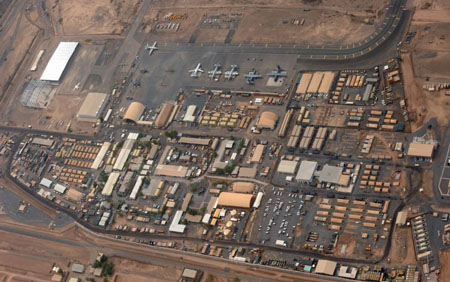by WorldTribune Staff, June 17, 2019
Since building its first overseas military base in Djibouti, in close proximity to a U.S. base, China has engaged in a series of “irresponsible actions” toward American forces, a senior U.S. military intelligence officer said.

China has tried to “constrain international airspace” by barring aircraft from flying over the Chinese military base, flashed ground-based lasers into the eyes of American pilots and deployed drones designed to interfere with U.S. flight operations, Rear Adm. Heidi Berg, director of intelligence at the U.S. Africa Command, told reporters.
Berg also said that Djibouti, as the host nation for the U.S. and Chinese bases, needs to “focus on maintaining their sovereignty” in the face of strong economic leverage from Beijing. China, she said, “currently holds over 88 percent of Djiboutian debt, and that is a concern.”
Berg said Chinese personnel also attempted “intrusion activity,” a military term for covert entry, with “attempts to gain access” to the largest U.S. military base in Africa, Camp Lemonnier.
The Pentagon formally complained to Beijing a year ago when two U.S. airmen suffered “minor” injuries suspected to have been caused by Chinese-deployed lasers in Djibouti, The Washington Times reported on June 16.
China has significantly increased its presence in Africa over the past five and is now “the second largest arms supplier on the continent, behind Russia,” Berg said.
“China [has been] the principal trade partner in Africa since 2016. They’ve tripled their loans since 2012, and Beijing is the major debt holder for multiple sub-Saharan African governments. Since 2014, we’re estimating over $172 billion worth of investments in loans,” she said.
African nations indebted to China include Angola, Zambia, Malawi, Mozambique, Zimbabwe, Tanzania and Kenya. Djibouti is considered one of the most vulnerable of China’s debtors.
Intelligence Brief __________ Replace The Media
